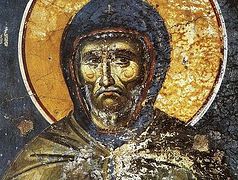Part 1, Part 2, Parts 3 and 4
Part 5, Part 6
“O Lord and Master of my life! Give me the spirit of patience!” Oh, how we need to ask for the spirit of patience! After all, the Lord said: In your patience possess ye your souls (Lk. 21:19). Why is that so? Because, says Jesus Christ, strait is the gate, and narrow is the way, which leadeth unto life, and few there be that find it (Matt. 7:14). The path of Christian life is the path of sufferings and sorrows. The Lord warns that In the world ye shall have tribulation: but be of good cheer; I have overcome the world (Jn. 16:33). Only through patience can we save our souls.
The holy apostle James says in his Epistle: My brethren, count it all joy when ye fall into divers temptations; Knowing this, that the trying of your faith worketh patience. But let patience have her perfect work, that ye may be perfect and entire, wanting nothing (Jas. 1:2–4). Do you hear? Patience makes us perfect, without any inadequacies. And the holy apostle Paul writes, For ye have need of patience, that, after ye have done the will of God, ye might receive the promise (Heb. 10:36)—eternal life, the Kingdom of God.
All the apostles, besides St. John the Theologian, endured many great sorrows, persecutions, harassments, and finally martyric death (only the apostle John died a natural death). The signs of an apostle, says the apostle Paul, were wrought among you in all patience, in signs, and wonders, and mighty deeds (2 Cor. 12:12). But in all things approving ourselves as the ministers of God, in much patience, in afflictions, in necessities, in distresses (2 Cor. 6:4). With these words the great apostle showed all of us his apostolic character in great patience. And to his disciple, Bishop Timothy, the apostle enjoined, But thou, O man of God … follow after righteousness, godliness, faith, love, patience, meekness (1 Tim. 6:11). And if the bishop was enjoined to follow after patience, then how could we weak Christians reject this virtue? After all, without patience it is impossible to enter the Kingdom of God.
How can we acquire patience? We need to get used to enduring, trying not to complain, and of course, asking God for help. If we will ask God persistently, then it will happen with us according to Christ’s words: If ye then, being evil, know how to give good gifts unto your children, how much more shall your Father which is in heaven give good things to them that ask him? (Matt. 7:11).
It is pleasing to God for us to ask for patience, and God will help every Christian who calls out to Him from under the weight of his own cross. But evil people seeking the sinful path also ask for help. God will not grant them any help, but the Lord will help to good Christians who humbly walk the path of Christ; after all, in the words of the apostle, God is faithful, who will not suffer you to be tempted above that ye are able; but will with the temptation also make a way to escape, that ye may be able to bear it (1 Cor. 10:13).
Our woes are nothing compared to what our Lord Jesus Christ endured for us. Therefore we must endure, seeking comfort and looking unto Jesus the author and finisher of our faith; who for the joy that was set before him endured the cross, despising the shame, and is set down at the right hand of the throne of God. For consider him that endured such contradiction of sinners against himself, lest ye be wearied and faint in your minds (Heb. 12:2–3).
This is what we have to strengthen ourselves in, and from which we can endlessly draw patience. Gaze more often at the Holy Cross, the Savior crucified on it, and pray together with St. Ephraim the Syrian: “O Lord and Master of my life, grant the spirit of patience to me Thy servant. Amen.”








